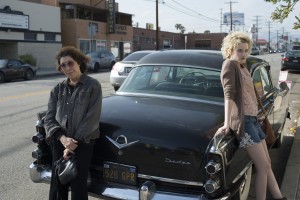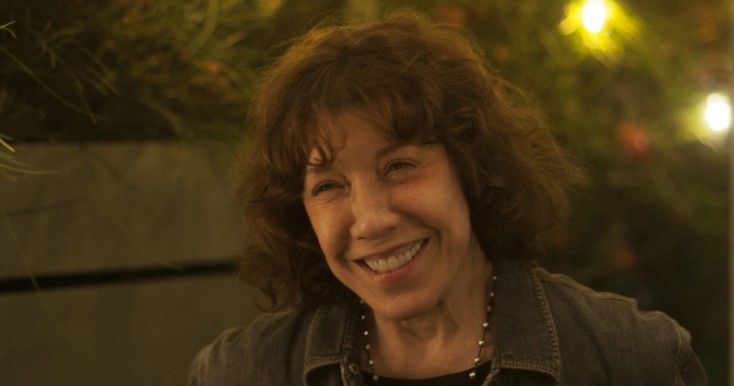
(l-r) Lily Tomlin as Elle and Julia Garner as Sage in GRANDMA. ©Sony Pictures Classics. CR: Glen Wilson.
By ANGELA DAWSON
Front Row Features
HOLLYWOOD—Fresh from her Emmy-nominated role as dumped housewife Frankie on Netflix’s “Grace and Frankie,” legendary comedienne Lily Tomlin tackles another character who is undergoing a relationship crisis in Paul Weitz’s independent dramedy “Grandma.”
As Elle, she is an aging intellectual hippie lesbian who breaks up with her much younger girlfriend (Judy Greer) of two years while still grieving a former long-term love who passed away. Amidst her own crisis, her teenage granddaughter Sage (Julia Garner), shows up on her doorstep one morning seeking help. The girl needs money for an abortion that she’s scheduled for later that day.
Elle, too, is running short on cash but she is determined to help the girl, and the two go on an unusual trek, visiting Elle’s old pals, to scare up the money for the procedure. As it turns out, most of her friends don’t have much money either. The last thing grandmother and granddaughter want to do is tap Judy, Elle’s judgmental and work-focused daughter (Marcia Gay Harden). As the hours go by, and their potential resources grow dim, Elle turns to Karl (Sam Elliott), her ex-husband, for one last shot. Their reunion is explosive and reveals old wounds that have never healed. With the appointment pending, the two women finally turn to Judy.
While the subject matter might not seem ripe for comedy, Weitz’s script in the hands of Tomlin, Harden and Garner, as well as host of supporting characters including Laverne Cox (“Orange is the New Black”), John Cho and Nat Wolff, manages some laughs and some truly heartfelt moments.
Tomlin, 75, who is openly gay, recently spoke about playing aging hipster Elle, which was specifically written for her by Weitz.
Q: Your grandma character is a lot cooler than most grandmothers. How did you see her? Did you think of somebody you knew in creating her?
Tomlin: Paul (Weitz, the writer/director) really did write it with me in mind. Looking from it from the outside I wouldn’t’t have said that I’m like Elle, but I think that I must be a great deal like Elle, because it was so easy, so fluid, and so natural. There are things you have to transpose yourself, from something or some experience or other person you know, but it was terribly natural to me. That was a blessing.
Q: Do you find it more creatively freeing to do a small, independent film like this as a change of pace from big studio movies, particularly with regard to the humor?
Tomlin: This was much more freeing. I didn’t’t even realize how funny it was until I saw it with an audience.
Q: You’ve played so many different types of characters in your career, but this is one of the few times you actually play a gay women. What does that mean to you to have this written for you in this way?
Tomlin: I’ve played so many different kinds of characters. I guess it was good that I got a chance to play myself, or someone like myself. But yes, this character is very much like me, physically, just every way in terms of the youthfulness in her body. She’s not stunted in any way for the years she lived. I drove my own car and I wore my own clothes, so it was quite a bit close to me. It was great.
I must say I don’t think the picture would be as good as it is if Paul hadn’t been able to cast so many good actors in the picture. None of us would have looked so good, but because every role was just so well written and well acted, it is just a blessing. It’s one of those lucky things that happens in your career. You don’t plan for it at all.
Q: Elle is a lesbian, but not much is made of it by her daughter or granddaughter. It’s just part of who she is. What are your thoughts on this matter-of-fact sexuality of Elle?
Tomlin: I think it’s extraordinarily wonderful that a big deal isn’t made out of her sexuality, that she’s just another person.
Q: After playing so many different roles over the years, do you feel like you continue to make a stronger and emotional connection to your characters?
Tomlin: I’m sure its true, but it happens so incrementally. I don’t know that you’re even conscious or aware of it. I got nominated (for an Academy Award) for my first role, (Robert Altman’s) “Nashville.” I’ve never been nominated since. I think that the instinct is there in most actors, but it has to be on the page, and it was there in this script.
Q: What was it like working Julia Garner, who plays your granddaughter, Sage?
Tomlin: I just fell in love with Julia. We became great friends. Right away we bonded. When Paul (Weitz) brought her to my office to meet me, I said to him, “Make sure she knows (getting the role) doesn’t’t depend on that meeting,” I told him to make sure she knows she already had the role. We’re kind of making her meet me for the opposite reason, because I didn’t’t want her to feel discounted or second-guessed, or anything like that.
I knew she was wonderful when I saw the pictures of her in the other small movies she’s done. She’s just a natural. She’s just wonderful. And when Paul told me that Sam Elliott was going to play my ex-husband and Marcia Gay Harden was going to play my daughter, I was just flabbergasted. It’s just a fabulous testament to him.
Q: You’re character has all this anger, which didn’t’t become one note or marginal, but really got to the hurt underneath. Could you speak a little bit about getting to that? Did you really have to stretch for that, because it looks so easy?
Tomlin: I’m quite thrilled that you view me with that type of complexity of performance, but I can’t own it. It was all Paul’s writing.
Q: What do you suppose happens to Elle after the movie?
Tomlin: She says she want’s to go home to write. She’s lived long enough to know that in terms of this relationship with her younger girlfriend (played by Judy Greer), she could be selfish and take the girl into her life. She knows that it’s not really a relationship of equals, and that it probably will end badly at another time. And she feels she is taking precious time away from that girl.
I think she’s going to have pizza at her daughter’s the next night. She and her daughter may not hit it off that great. It may not be natural or easy, but when she shows up for pizza, that’s a win. When people live long enough and they have enough sensitivity, they’re so aware of their own mortality —all that stuff —they still have flights of anger and whatever, but it’s mostly against inequity or injustice. It might still be ego-driven, but I also think you want to make things easier for yourself and for everyone else in some ways.





